- Home
- Scott Turow
The Burden of Proof kc-2 Page 20
The Burden of Proof kc-2 Read online
Page 20
"! see." Well, the Lord only knew what Margy had heard in her time, but the thought of informing her still made Stern shudder. He would never explain the true circumstances to her any more than to anyone else. It would appear to her 'to be another example of the bad faith men were always capable of. "And I take it, for the present you recommend abstinence?" he asked almost hopefully. He had resolved over the weekend to revert to ret'nment.
Peter smiled in a quickly fading trace, amused by the thought of his father with a sex life, or, more likely, by the."fact that he had the right to govern it.
"Well, you're not active. And we'll know soon whether or not you're prodromal. If it's subclinical, a sheath is adequate to protect your parmer. All in all, I'd think that's enough. Assuming you're consistent."
"'Yes, of course." Stern fluttered a hand to show that this conversation was purely speculative. Truly, he no longer cared.
Peter withdrew the lavender-topped vial from the syringe.
He shook the blood, eyed it, and went back to his desk to make various notes. While he busied himself, Stern pondered his final inquiry.
"This disease cannot be contracted by accident, can it, Peter?" He could not keep himself from asking, but the question sounded, even to him, lame and pathetic.
'"Is that how you're afraid you got it, PaT' Peter's amusement, when he glanced up, was clearly no longer. guarded.
Not that this remark seemed particularly rancorous. Peter was always waspish, sarcastic. But Stern realized that there was little chance that his daughters would not hear of some of this. Peter's professional confidence could be expected o reach only so far. This tidbit was far too delicious. Details would be sparing, but something telling would be said. Kate, for example, needed some comfort. 'You know how concerned you were because Pa was coming in late in the -morning?" The tittering, at least, would be fondly in-spired-and-far from the real problem.
"I was not thinking of myself."
"Your ladyfriend?"
Stern made a noise of assent. His ladyfriend. Peter took a second, intent on labeling the tube.
"I would love to help you harbor illusions, but the odds are pretty slim. If your friend has been tested, that means a vital culture, and ff it's HSV type 2 that's been identified, then sexual contact is almost certainly the source. You know, the old toilet-seat thingm" Peter didn't finish the sentence. Instead, he simply made a face.
In spite of himself, Stern sighed. He had been prepared for that verdict. Clara Stern, as he had known her, was a woman of attractive bearing and, as she herself was inclined to acknowledge, looks that had improved with age. As adipose and crow's-feet, all the usual corporeal failings, had overcome others, Clara maintained her pleasant eternal look, dignified and composed. Stern had always admired her because at any age she was a far handsomer person than he.
But certain women, married women, mothers prototyp-ically, became too involved with the dense network of their activitiesrathe nurturing, organizing, doing, and attending-to broadcast any ostensible sexual interest. In thtirty-odd years, he could not recall an instant of conscious jealousy, a man whose attentions, for whatever reason, had seemed to excite her. She was a person who defined by her daily conduct what was not wayward. She was on a higher plane than that.
Thus, even days later, Radczyk's news remained unfathomable. It went, somehow, beyond right and wrong. The idea of a fifty-eight-year-old woman,-this fifty-eightyear-old woman, on the eve of grandmaternity-with a sexually transmiRed disease was as horrifying as some freak-show grotesque. Would the antecedent practices erupt only in late middle age? Perhaps he had spent a married lifetime playing the fool. He refused to believe it. It was like the concept of a fourth or fifth dimension. Beyond the capacities of an ordinary mind-or at least of his. Call it machismo or personal limitation, he could not envision his wife, as she clearly had been, with another man.
And it was for this reason that she had done what she had.
In his ravaged state of the last few days-amid the torment, the anger, the reviling and utter disbelief-that fact had not been lost. Her intent had been to spare him.
This was not sentimentality or self-delusntence. Instead, he simply made a face.
In spite of himself, Stern sighed. He had been prepared for that verdict. Clara Stern, as he had known her, was a woman of attractive bearing and, as she herself was inclined to acknowledge, looks that had improved with age. As adipose and crow's-feet, all the usual corporeal failings, had overcome others, Clara maintained her pleasant eternal look, dignified and composed. Stern had always admired her because at any age she was a far handsomer person than he.
But certain women, married women, mothers prototyp-ically, became too involved with the dense network of their activitiesrathe nurturing, organizing, doing, and attending-to broadcast any ostensible sexual interest. In thtirty-odd years, he could not recall an instant of conscious jealousy, a man whose attentions, for whatever reason, had seemed to excite her. She was a person who defined by her daily conduct what was not wayward. She was on a higher plane than that.
Thus, even days later, Radczyk's news remained unfathomable. It went, somehow, beyond right and wrong. The idea of a fifty-eight-year-old woman,-this fifty-eightyear-old woman, on the eve of grandmaternity-with a sexually transmiRed disease was as horrifying as some freak-show grotesque. Would the antecedent practices erupt only in late middle age? Perhaps he had spent a married lifetime playing the fool. He refused to believe it. It was like the concept of a fourth or fifth dimension. Beyond the capacities of an ordinary mind-or at least of his. Call it machismo or personal limitation, he could not envision his wife, as she clearly had been, with another man.
And it was for this reason that she had done what she had.
In his ravaged state of the last few days-amid the torment, the anger, the reviling and utter disbelief-that fact had not been lost. Her intent had been to spare him.
This was not sentimentality or self-delusion. After all the calculations, the conclusion remained the same. There was a lapse here, a monumental breach of faith which in life, perhaps, she might never have lived to see him forgive. She had saved herself great pain as well. But in the end her kindness, her fundamental kindness, remained her lodestar, her guiding light.
Oh, Clara! On the chair, With his sleeve rolled and his bled ann still vaguely atingle, Stern teetered for an instant on the verge of tears.
With that, his life, what was left of it, the many small illusions, would disappear.
Peter would have to be told, or might even guess. He saw that and, in the sluices of powerful remorse, for a moment did not care. Then his pride, with the grinding precision of a huge laboring machine, engaged once more and brought him fully about. He rolled down his sleeve over the gauze Peter had taped inside his elbow.
"And if this illness were to appear," Stern asked, "there is no treatment?"
"There' a drug called acyclovir. Ointment or pills. It's very successful in reducing the active period, and in many people it even prevents recurrence. Generally, the disease retreats into the nerve ganglia and waits to rear its ugly little head. Sometimes it never does. Sometimes it returns every few months, in ever-weakening episodes. That's the usual course. But there are all kinds of extraordinary clinical histories. Acute cases. Florid recurrences years apart. The most,difficult part of it is prodromal-you're in a contagious phase for a day or two before the visual signs appear, and short of a culture, you can never be completely certain that you won't infect someone else. It can mess up your life pretty well. In addition to being extremely uncomfortable."
"Yes," said Stern. His mind remained on Clara. All told, the weight of events seemed again to have settled on him with all their dead-star density. The facts, the facts. He had always placed his faith in particulars. Well, now he had them, lots of them. Many facts and, he supposed, certain inevitable conclusions.
He stood up and, without allowing time for reaction, touched his son's smooth face. "You are a good doctor, Pe
ter. I appreciate your concem.
' '
Wise and sad, Peter nodded. His eyes did not leave his father. His son seemed to have a gift, a sense for the human nuance, the pathos that trailed along with each disease, mortality's dismal gossamer.Stern was pleased to find him so worldly. In their relationship, there was rarely anything subtle.
"Look, I'm sure you're okay," Peter said. "We'll just watch it. All right?"
"Very good," said Stern. He tossed on his suit coat. "I am grateful.
And sorry, Peter, to have involved you in such a disagreeable business."
"Oh, hell," said Peter. "You know what they say."
"What is that?" asked Stern. He was at the door.
"Life is full of surprises." His son was smiling. No doubt, he was thinking already about telling his sisters.
DIXON, predictably, enjoyed competition and for years had utilized every excuse to lure Stern into joining him in various sports. As Stern was apt to say, a business meeting with Dixon generally meant he would sweat. When Stern was younger, and considerably thinner, they had played handball at Dixon's downtown club. Stern was more nimble than his appearance might suggest, but he was no match for his brother-in-law. Larger, stronger, and far more athletic, Dixon never seemed to tire of winning. In season, he would bring Stern out on Lake Fowler to fish. Stern would foul his line and cast into the hushes and lily pads; back on shore, Dixon would describe Stern's ineptness to everyone they met. 'The only man who ever went fishing and nearly took a bird. I kid you not. Cardinal up in a tree? Stern missed hooking him by inches." Stern often told Clara that he was the trophy Dixon wanted stuffed and mounted.
By now, Stern had limited this rivalry to golf. Stern had more feel for this game; he was better on land than sea.
But, as usual, he did not play often enough to offer any serious competition for Dixon, who was virtually a scratch golfer. Dixon was a daring trouble player; he loved the shots where he had to rest one foot in the crotch of a tree or fade the ball around a light pole, and he was particularly reckless here on his home course. The Greenwood Country Club was cut a century before into these rolling hills, nearly forty miles from the city. This was horse country, with hills deep in elm and oak, poplar and pine. Easton University was no more than ten minues away.
Here, with Lake Fowler, the well-to-do breathed cooler air and pretended that the city that kept them rich was nowhere near. Dixon adored this life, like every other badge of status, and had his principal home nearby, a huge stone house which sat on twenty acres on the lakeshore.
They played from an elecc cart, accompanied by a forecaddy.
Dixon usually had one or two favorites, high-school-age boys, hardscrabble types with whom Dixon could josh about their sex lives, offering them his golfing theories after each successful shot. DiXon treated these boys kindly and tipped them shamefully well. Today they were accompanied by a'young man named Ralph Peters, a black kid who lived in DuSable and traveled nearly an hour and a half by train to reach the Greenwood Club on the weekends. Next year, Dixon was going to get a golf scholarship for Ralph, who was the caddy champion. With Dixon, this was not just talk. If need be, he would endow the scholarship himself. But he would also expect a chorus of appreciation and various acts of reverence befitting a beneficent king.
Stern waited until the third tee to talk about the investigation.
"I visited with Margy."
"So I heard," said Dixon. He was practicing his swing, but Stern thought he detected something whimsical in Dixon's expression. On the other hand, he could not doubt Margy's discrefon.
This hole, like most at Greenwood, was short and narrow, a little dogleg cut into the woods, about 330 yards. The green was set to the right of the fairway, so that the hole, sketched on the back of the scorecard, looked like a lowercase p. Dixon waggled his driver mightily over the ball, then pulled his shot deeply into the trees.
"Shit. Well, Ralph will find it. There." He pointed the driver toward the hollow below where Ralph.had emerged from the woods to indicate that the ball had been located.
Stern took the ground on his drive, but the ball hopped down the fairway. With the angle, Dixon would be away. He floored the cart and they zoomed down the hill together.
Stern, wearing a tam, held it and yelled a bit over the wind.
"I looked at the records the government wanted, before turning them over. And I also examined what I presume the agents assembled at Datatech."
"And?"
"And I am concerned."
Dixon glanced back, very briefly. He drove the cart up to Ralph.
"Right there, Mr. Hartnell. You better punch out." Dixon tromped in and out of the bushes. Stern could not see the lie, but had no urge to follow. He'd seen it before: Dixon making faces, muttering, conferring with Ralph with the gravity of a general.
"I'm going for broke," Dixon yelled.
What else was new? Ralph could be heard quarreling. He was telling Dixon he could never do it. The sun gleamed through the foliage behind the two figures.
The shot, bedded on dried leaves and twigs, sounded cleanly, but a second or two on in its course took a tree with the round musical sound of marimbas. The ball rattled around in the wooded heights, breaking branches, then suddenly fell heavily to earth, like a gift from heaven, only twenty or thirty yards from the green. Dixon came crashing out of the bushes in time to see the ball drop. He turned back to Stern with a magnificent smile.
"Member's bounce."
Ralph followed along, carrying the club and shaking his head.
Watching Dixon march across the fairway toward the cart as he continued congratulating himself, Stern was taken by an intimation, soft as a whisper, of the young soldier he had met decades ago, during basic training in the desert at Fort Grambel. They had encountered one another some-how-in the barracks or the latrines. At this point Stern would have preferred some auspicious recollection of their meeting, but he remembered little, only the predictable bad judgment of youth. He had liked Dixon; worse, he had admired him. Dixon was one of those large commanding figures that Stern could never be-a shrewd country boy, a good talker with a disflnct, twangy hill accent, who looked like a mallion in his uniform, square-shouldered and jutjawed, with wavy dark blond hair. With the advent of war and the death of his mother, Dixon, full of red-hot ambition, had joined up. The service, with its grand traditions, its medals, its legends, was like a cast for an ingot. Dixon saw himself as an American hero in the making.
Stern had enlisted, too, but with ambitions less grand.
When he was honorably discharged, he would automatically become a citizen and thus put to rest the family's perpetual concerns about their outdated visas. He was twenty years old and already a college graduate, having raced through school, a dark sunken-cheeked sort with heavy black hair, much slimmer than today's model. He had done better in the-service than those who knew him now might expect; he had sealed the walls and carried the packs without relish, but he was dull to discomfort of most kinds in those days. His hungers inspired him.
Stern was never certain what there was about him that had drawn Dixon's interest-probably the fact that Stern was college-educated and quickly marked for OCS. It mattered not. The alliances of a soldier's life were easily founded, and in 1953 a hillbilly, or a Jew with a Latin accent, picked from limited entrees on the American social smorgasbord.
There was a night when he and Dixon had sat on a bunk, passing back and forth a smuggled bottle of-Jack Daniel's and a pack of Camels, talking.
About what? The future, Stern believed. They both had plans.
For Stern, the future was nearer than he imagined. One day, at the end of basic training, as he was readying to ship out for Officer Candidate School, his major announced that Stern was required at home. The officer did not explain, but the orders Stern was handed had a typical military brusqueness. In a blank was written, "Hardship furlough -mother critical."? She had had a stroke. In the hospital, he found her paralyzed and unable to spea
k. Her dark roaming eyes seemed to search his face meaningfully, but he was never certain that she recognized him. She was dead within a week, and Stern, now Silvia's sole support, was honorably discharged. He never returned to Fort Grambel.
All of it was left behind, his kit and duffel bag, the sadistic sergeants, OCS-and Dixon Hartnell. By now, over thirty years later, Dixon had as many faces to Stern as a totem pole-Silvia's husband, an important client, a local powerhouse in the avenues of commerce, one of the few men Stern knew well whose accomplishments he thought of as markedly overshadowing his own. He seldom remembered that yearning young man who had attached himself to him in that vaguely supplicating fashion.
Dixon hopped back in the cart, still radiant at his miracle shot. He would never willingly return to the subject of the investigation. Like someone who learned in his sleep, however, he expected Stern to force him to listen. They were at the stage now where Dixon-any client-had to recognize he was in mounting jeopardy.
"Dixon, this is a grave matter. These records are very damaging,"
"Maybe I should have taken a look at them before you turned them over," said Dixon. "Some of the problems might have disappeared." He smiled tersely.
"Dixon, I suggest you abandon such thoughts. If you follow that course, you may as well walk straight to the penitentiary and skip the intervening steps. Too many people have seen your business records. The company that put them on microfiche. Margy. Me." Stern let that sink in.
"Not to mention the chatty fellow who told the government to look for them in the first place."
Dixon looked at Stern directly, full face. His eyes were greenish, gray, a color hard to name.
"My thing get there?" Dixon asked. Eventually, Stern realized he was referring to the safe. He decided not to ask why the present discussion brought it to mind.
"Quite secure," Stern answered.
"I did it the way you said. Handled it myself. I even got Margy to cut a check in Chicago to pay the trucking company." The trucker, characteristically, had refused to take the safe any farther than the very center of Stern's office. Not much more than a foot square, the gunmetal cube must have weighed 150 pounds. After a week, Stern and Claudia had struggled to get the safe as far as it'was now, behind his desk. Out of an arch impulse, Stern had begun using it as a footrest.

 Testimony
Testimony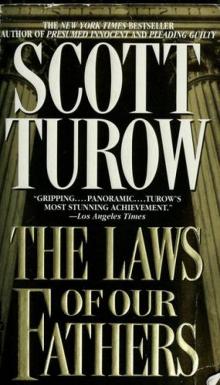 The Laws of Our Fathers
The Laws of Our Fathers Ordinary Heroes
Ordinary Heroes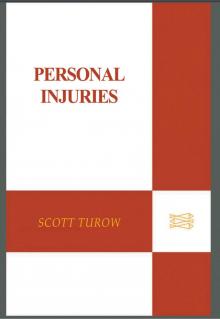 Personal Injuries
Personal Injuries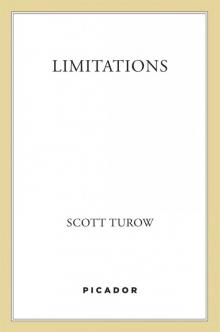 Limitations
Limitations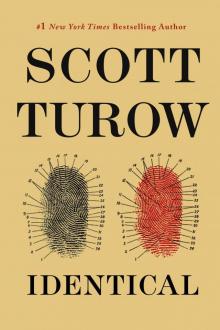 Identical
Identical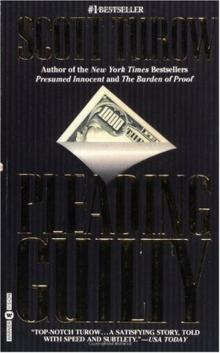 Pleading Guilty
Pleading Guilty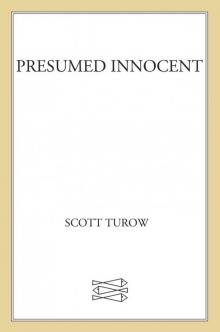 Presumed Innocent
Presumed Innocent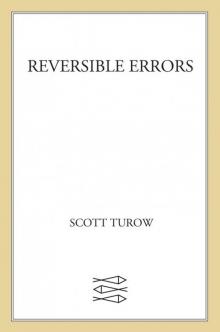 Reversible Errors
Reversible Errors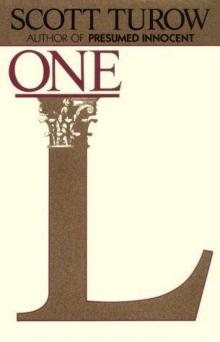 One L: The Turbulent True Story of a First Year at Harvard Law School
One L: The Turbulent True Story of a First Year at Harvard Law School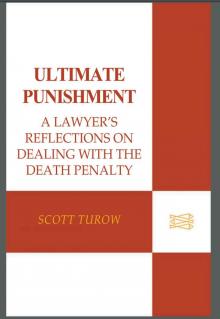 Ultimate Punishment
Ultimate Punishment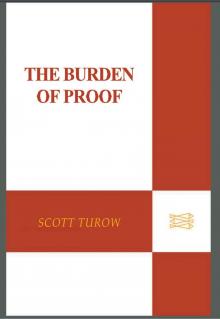 The Burden of Proof
The Burden of Proof Ordinary Heroes (2005)
Ordinary Heroes (2005)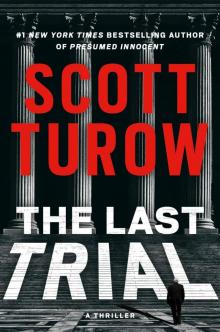 The Last Trial
The Last Trial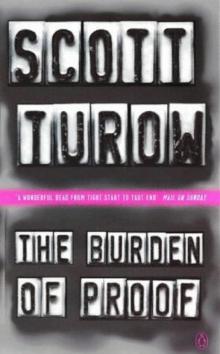 The Burden of Proof kc-2
The Burden of Proof kc-2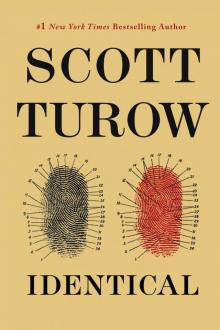 KC09 - Identical
KC09 - Identical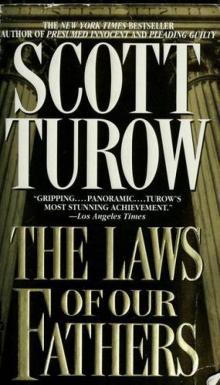 The Laws of our Fathers kc-4
The Laws of our Fathers kc-4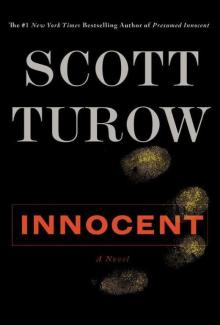 Innocent kc-8
Innocent kc-8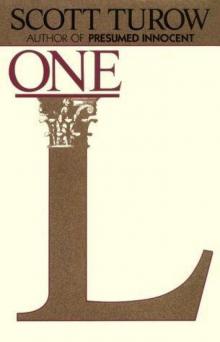 One L
One L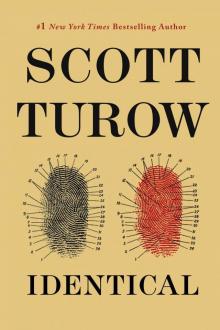 Identical kc-9
Identical kc-9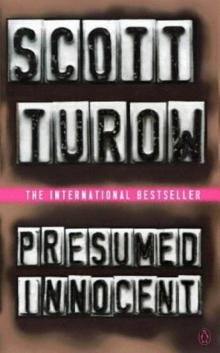 Presumed innocent kc-1
Presumed innocent kc-1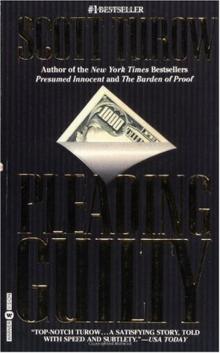 Pleading Guilty kc-3
Pleading Guilty kc-3 One L (1977)
One L (1977)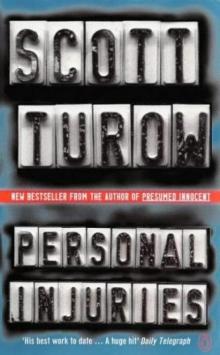 Personal injuries kc-5
Personal injuries kc-5